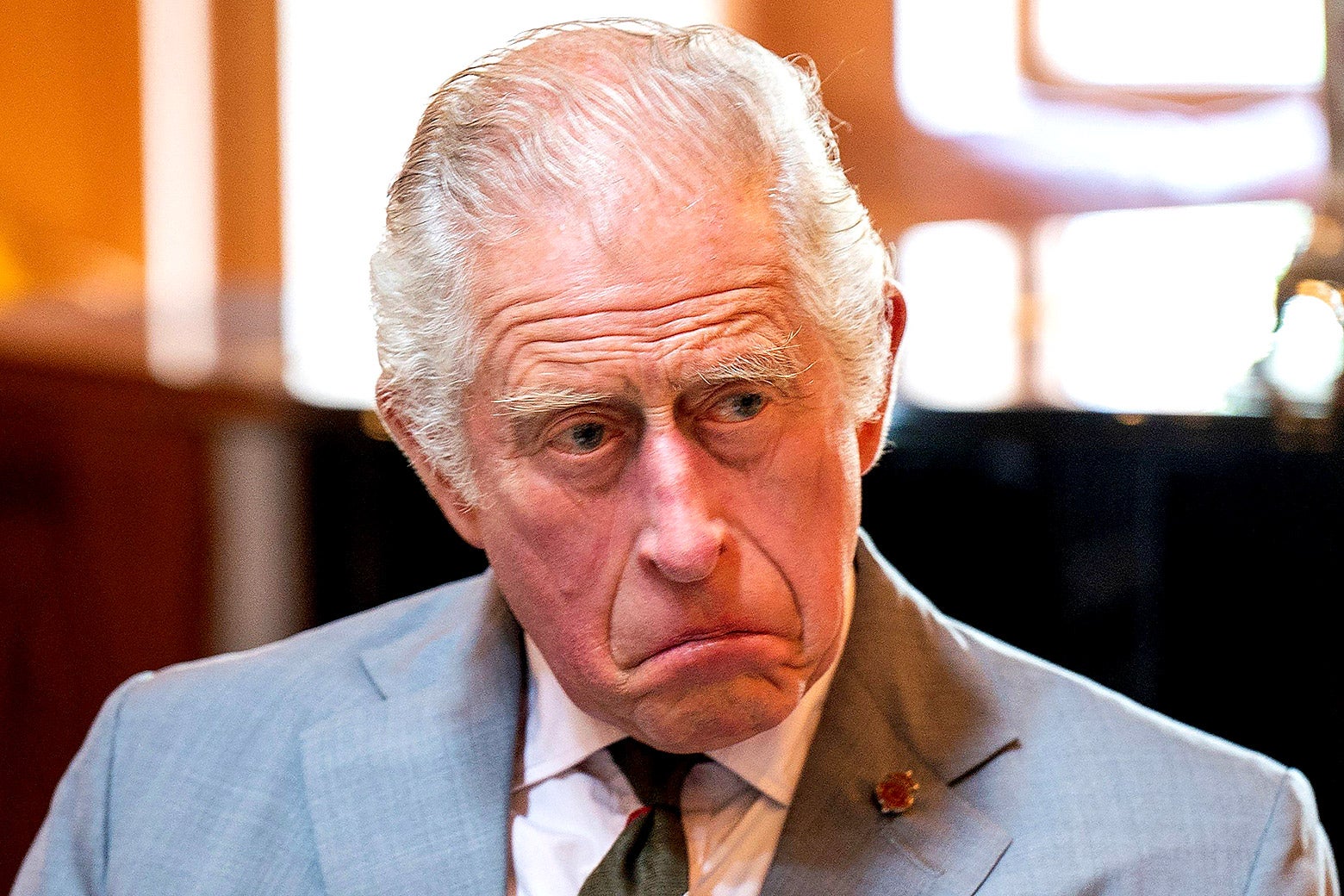Saturday is the official coronation of King Charles III . Given the occasion, we are revisiting a 2005 story from June Thomas—a defense of Charles written in advance of his second marriage.
Poor Prince Charles can’t catch a break. He had to postpone his wedding day to accommodate a funeral 900 miles away; devotees of his deceased ex-wife are threatening to picket the nuptials; and wedding memorabilia is selling poorly —apparently, his future subjects don’t want to dry their dishes on a towel bearing the likeness of his bride-to-be, Camilla Parker Bowles. His family and fellow royals won’t even do him the honor of inventing decent excuses to skip the ceremony—his father refused to cancel a trip to Germany (Germany!); Sweden’s crown princess is otherwise engaged opening an IKEA store in Japan—and his mother dashed his dreams of serving an organic feast at the reception.
Charles is an easy and usually deserving target. He’s the squarest man in the world, a rich, underemployed old fogy who has dressed and acted like the 56-year-old he is for the last 40 years. But after a lifetime of feckless world travel, dilettantism, and endless chukkas of polo, he’s finally coming good. Despite enduring years of unforgivably cruel jokes at the expense of the woman he loves, Charles is about to do something a Frenchman would never consider: He’s going to marry his mistress.
If the groom in Saturday’s ceremony were Charlie Windsor instead of “His Royal Highness Prince Charles Philip Arthur George, Prince of Wales, KG, KT, GCB, OM, AK, QSO, PC, ADC, Earl of Chester, Duke of Cornwall, Duke of Rothesay, Earl of Carrick, Baron of Renfrew, Lord of the Isles and Prince and Great Steward of Scotland,” he would be a hero—a mensch of modern maturity. But somehow the British press doesn’t see it that way. Instead of praising the prince for his devotion, the media have simply intensified the torture, gleefully reporting the many missteps on the way to the wedding.
Apart from doctrinal considerations—and since the British sovereign is the head of the Church of England, the royals are expected to be more frum than the person in the next pew—what’s wrong with two divorcees correcting the mistakes of their youth and finally getting wed? Just take a look at them: Charles and Camilla are living proof that love is blind. Yes, they committed adultery, but according to veteran royal-watcher Ingrid Seward, the prince didn’t resume his connection with Camilla until 1986, when his marriage had suffered an “irretrievable breakdown” and after Diana had cuckolded him at least twice—with Sgt. Barry Mannakee, one of her protection officers, and Maj. James Hewitt, a man she described as “her riding instructor.”
Camilla is the anti-Di. Whereas Diana was forever getting her chakras balanced and her colon irrigated, Camilla is self-confident and well-adjusted. Diana was obsessed with the trappings of celebrity, while Camilla, like the royals, prefers to hide her wealth behind a thick veneer of ordinariness. Her main interests are said to be horses, dogs, and farm prices—standard Buckingham Palace talking points, in other words.
Diana was the family student of self-help literature, but it’s Charles who has jettisoned his self-defeating behaviors. In his 20s, when he set out on the long road to the royal rose ceremony, he foolishly listened to the advice of his great-uncle and mentor Lord Mountbatten, who judged Camilla an unsuitable princess because she was older than Charles—by 16 months—and because she was “experienced.” Diana may have been a godsend for the House of Windsor’s gene pool and for the tabloid press, but she was a terrible match for Charles. Pledging his troth to a Sloane Ranger 12 years his junior with experience of absolutely nothing beyond a little light child-minding worked out annus-horribilisly for the prince of Wales. If Samuel Johnson was right, and second marriages represent the triumph of hope over experience, Charles and Camilla are an exception; in their case it is the long-deferred victory of experience over hope.
In an age when preposterously coiffed tycoons engage in serial matrimony with ever younger and more beautiful partners, Charles is doing his bit to atone for the sins of rich, middle-aged men everywhere. He’s making an honest woman of his age-appropriate partner, a woman with whom he is well-matched in looks, habits, and hobbies, whom he has known and loved for more than 30 years. Charles’ mistake was to get his weddings out of order: He married his first wife second and his trophy wife first.
